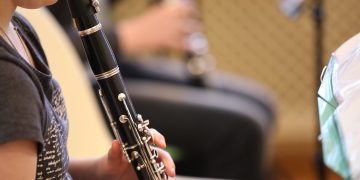By David Cook
Like all industries, the music industry requires customers to sustain itself and continue to manufacture products at a high level. The highest caliber of instrumental musician requires a certain acceptable level of instrument and accessories (such as reeds, mouthpieces, mallets, etc.) to convey their expression. Without quality manufacturers and businesses both large and small, band and orchestra performances would cease to exist.
Of course, this also applies at the school level. Students taking band or orchestra must have instruments in their hands to enjoy making music with others. Along with a dedicated and qualified teacher, the most important things students can have are properly functioning instruments. This does not necessarily mean expensive or new ones, but equipment that allows them to blossom and develop as musicians instead of impeding their growth. I can recall far too many instances where young clarinetists had difficulty producing a clear and consistent tone because pads on their instrument were not sealing or they constantly squeaked because their mouthpiece was extremely damaged and worn. Even though these students were receiving quality and appropriate instruction and attempting it to their own playing, the flaws in their equipment often led to them being discouraged, losing their interest in music and quitting entirely.
Music education helps to advance the music industry by exciting young students about music and keeping them involved in music long after their school days have passed. One of our biggest goals is to create lifelong musicians and patrons of the arts, not just students who contribute positively to school band and orchestra programs. If students continue to play after leaving school, they continue to help the industry through their purchase of instruments and various accessories. If manufacturers do not have the revenue to stay in business, they will be forced to close and will no longer be able to provide equipment for students, professionals and enthusiasts alike.
However, our goal as music educators is not simply to keep the music industry alive. Music education and the music industry form a symbiotic circle: if the music industry has the consistent support and patronage necessary to sustain business, then each manufacturer can continue to develop new products and manufacturing techniques to make instruments easier to play as well as make music more accessible to anyone from a low-income household. If more people can enjoy making music, the artform will carry on further and longer in a rapidly changing society. More people will be touched by the positive impact of being musicians at any level, which will make the world a better place to be.
With music education playing such a vital role in advancing the music industry, there are several topics music educators can expose themselves to and learn about to help provide their students with as positive and rewarding an experience as possible:
1. The relationship between instruments, accessories and the playing experience: Teachers should have a basic understanding of how to “fit” their students to different equipment and how different instruments or accessories change how it feels to play the instrument. If a brass student is having difficulty producing a characteristic tone on their instrument and everything in the student’s embouchure is acceptable, their teacher would ideally know of alternative mouthpiece models that the student could try to allow their playing to advance, based on the student’s physiology.
2. Proficiency on all instruments in their ensembles: Teachers should be able to demonstrate a reasonable level of proficiency on each instrument, for both modeling technical abilities for their students and demonstrating expressive playing on the instruments. Students will be more likely to succeed if they have a concrete model of the technical and musical goals they are striving for. Beyond this, a reasonable level of proficiency on each instrument also will mean the teacher can identify when something is not functioning properly on a student’s instrument. If a teacher were not able to sufficiently play the flute, they would not be able to play a student’s flute and identify if any issues or difficulties caused by the flute.
3. Basics of instrument repair: To help students regain access to functioning instruments as quickly as possible, a perfect world would include teachers who can make minor, basic repairs in their own band or orchestra room, so students do not have to be without their instrument for days or weeks at a time. Naturally, these skills take time and commitment to develop, but the benefits to school programs are impactful enough to make it worthwhile.
These skills can originate in the music industry, and they make a huge difference in the happiness and success of band and orchestra students. An ideal situation would allow these skills to be introduced during music teacher education programs in colleges and universities. If students are happy and feel they are making a difference, their music education will cultivate a lifelong appreciation and enjoyment of music. Their support and active participation in music will benefit the music industry, which will in turn be able to continue innovating in the field to help advance music participation for everyone.
LisasClarinetShop.com
You may also like:
 SBO Presents The 19th Annual 50 Directors Who Make A Difference
SBO Presents The 19th Annual 50 Directors Who Make A Difference
 2012 ’50 Directors Who Make a Difference’ Report
2012 ’50 Directors Who Make a Difference’ Report
 2011 ’50 Directors Who Make a Difference’ Report
2011 ’50 Directors Who Make a Difference’ Report
 The 22nd Annual 50 Directors Who Make a Difference
The 22nd Annual 50 Directors Who Make a Difference
 SBO Presents the 21st Annual 50 Directors Who Make a Difference
SBO Presents the 21st Annual 50 Directors Who Make a Difference





















